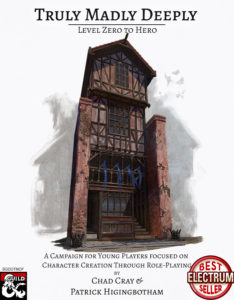2,734 views
Improv for Gamers by Karen Twelves
Pick up any recently published role-playing game (or sometimes even a modern supplement to any given rule system) and there is a good chance there is a section communicating what a role-playing game is. This isn’t a bad practice. I like that fewer games assume that every reader already knows the basics of RPGs. And most systems do a great job of explaining the game’s mechanics, player options, and settings. But rare is the title that tells you how to role-play the game or even what makes for good role-playing. Improv for Gamers is a book by Karen Twelves that seeks to bridge the gap between theatrical improvisation and tabletop role-playing.

I went to my friendly local game shop looking for nothing in particular. All I walked out with was this 2018 book published by Evil Hat Productions. That’s a testament to my inability to make decisions on new RPGs and not a reflection of my FLGS offerings. At any rate, when I thumbed through the book I was reminded of a friend who was lamenting live-play podcasts that tend to focus more on (over)acting than on playing the game. I was partly curious to learn whether those people were doing bad improv (he thought so). But more than that, I wanted to see if I could get any takeaways for being a better gamer. And even a better gamemaster.
Improv for Gamers
This book presents both theoretical concepts of improvisations and practical exercises so you can experience those concepts firsthand. For me, the biggest value is in the concepts. It’s one thing to know what you like. Being able to intuit what is working in social interactions (gaming or otherwise) is an invaluable skill. But understanding the elements driving better engagement means you can master them and proactively create more rewarding interchanges.
For example, understanding what an offer is will not only help me recognize when I’m receiving one but also how to accept it. Twelves tells us that an offer is essentially everything someone tells you. The assumption in role-playing being that it is everything the character tells you. If your character isn’t cued into the offer and refuses it, it’s a dropped offer. It can be accidental. But sometimes dropped offers are intentional. Who here has not played a session where some player awkwardly forced a scene into another direction? Maybe it was something like this:
Barbarian: I’ll hack my way through the door with my battleaxe!
Rogue: *blinks while holding lockpicks*
I get it. Barbarians like to smash things. And perhaps the barbarian in this example already had her heart set on hacking her way through the locked door. It’s not normally the case that someone thinks another player is getting too much of the limelight. In my experience, it’s usually just that someone has planned out the perfect action or interaction in their head and hates to lose it. Such interruptions here and there aren’t a big deal and can even help break the tedium or monotony of dungeon-crawling. Nonetheless, situations like these can pile up over time and detract from the overall experience.
I contend that immersion is one of the best things about RPGs and building immersion doesn’t rest squarely on the GM’s shoulders. The players should be in tune with one another and know when to shine and when to let someone else get the spotlight. Improv is a skill and, as with any skill, it can be improved with deliberate practice. Sure, some are more naturally predisposed to improvisation than others. But everyone can improve their improv.
Where can you find Improv for Gamers by Karen Twelves?
I picked up my copy from my friendly local game shop. However, you can buy it from DriveThruRPG.com or from Evil Hat’s website. As of this writing, Evil Hat has sold all of its print versions. The Summoning Grounds doesn’t do traditional reviews and we recognize that this spotlight falls short of conveying what a good review would. However, you can visit the review section for Improv for Gamers on Evil Hat’s site here for some great content.

